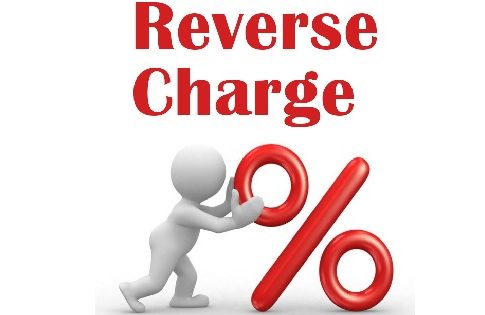The reverse charge mechanism under service tax is not alien to us. We have been dealing with this system since long. Under this concept a few categories of specified persons (generally service recipients) are made liable to discharge service tax liability on the services received by them. The provider of service is released from paying service tax on the services rendered by them. Though the validity of reverse charge mechanism was also challenged before the judiciary but it was upheld by the court. Earlier the reverse charge concept was restricted to a few categories of services but after the introduction of negative list regime under the service tax it has spread its wings to many services and nowadays we have been frequently facing reverse charge tune. Moreover, it is now coming in the form of Joint charge also where partially the service provider and service receiver are made liable for a few categories of services.
Time and again, we have been facing difficulty in applying the concept of reverse charge in its true spirit. The reason for the same may be due to ignorance on the part of assessee , due to petty nature of transactions where reverse charge is applicable or due to clumsy provisions of law which discourages assessee to get registered and pay tax under the reverse charge. So the bonafide assessee chooses to pay service tax in full to the service provider instead of paying at their own. This action of the assessee puts him into trouble when the accounts / records are examined by the service tax authorities. The instant action of the dept. would be to raise the demand on the assessee to pay service tax on the service received by them. Here, the role of professional starts to save the assessee from the clutches of the service tax.
It is correct that principally there should not be double taxation on the same value of service. When the provider of service has already paid the service tax on the value of service, the recipient should not be again called for to pay the same. But this depends on the nature of the facts and circumstances of each case and the type of evidences produced in satisfaction of the same. Let us examine the judicial position in this regard.
Recently, the Hon’ble Ahmedabad Tribunal in case of Angiplast (P.) Ltd. Vs. Commissioner of Service Tax, Ahmedabad [2013] 35 taxmann.com 621 (Ahmedabad – CESTAT) held that recipient cannot be asked to pay service tax under reverse charge, if service tax is discharged by service provider. In this case the assessee-company paid freight charges for outward transportation of goods and did not discharge service tax thereon under reverse charge. Assessee claimed that Rs. 40,850 out of total demand had been paid by transporters/service-providers themselves for which requisite certificates were enclosed and only balance Rs. 22,349 was payable by them, which was, accordingly, paid. Assessee argued that since service tax had been paid by service provider, tax liability could not be fastened upon them.
The tribunal observed that Transporters/service-providers had, in their certificates, categorically stated that service tax liability for invoices raised on assessee had been discharged by them and they had also mentioned their service tax registration number and PAN number in their certificates. In view of such documentary evidences, it could not be said that there were no authentic documentary evidences. Further the certificates clearly indicated service tax registration number, revenue was expected to call for details from concerned jurisdictional service tax authorities. Having not done so, Department cannot shift entire blame on assessee .In view of judgments in Navyug Alloys (P.) Ltd. v. CCE [2008] 17 STT 362 (Ahd. – CESTAT) Mandev Tubes v. CCE [Final Order No A/912/2009-WZB/Ahd, dated 20-5-2009] and CST v. Geeta Industries (P.) Ltd. and further in terms of CBEC Circular No. 341/18/2004-TRU (Pt.) dated 17-12-04, assessee could not be made liable to pay any service tax. Hence, demands were set aside and the case was disposed off in favour of the assessee.
Let us examine one more case of the same Tribunal wherein it was held that in case of reverse charge, service provider’s defence that liability to pay service tax is on service recipient is sufficient to set aside demand against service provider. In case of Commissioner of Service Tax, Ahmedabad Vs. Landmark Automobiles (P.) Ltd. [2013] 31 taxmann.com 168 (Ahmedabad – CESTAT) the assessee company was an insurance agent received commission from the general insurance company. The department demanded service tax thereon. Assessee argued that his services were covered under reverse charge under rule 2(1)(d)(ii) and insurance company was person liable to pay service tax. Department asked assessee to furnish certificate of discharge of service tax liability from general insurance company. The first appellate authority has relied upon the certificate given by M/s. IFFCO-TOKIO General Insurance Company Ltd. to that effect. But revenue stated that the certificate which has been produced by the assessee before the first appellate authority does not clarify the period to which service tax has been claimed to have been paid by the M/s. IFFCO-TOKIO General Insurance Company Ltd., and the first appellate authority has not verified the payment particulars made by the insurance company corresponding/relating to certificate in question and hence the order in appeal passed in favour of assessee needs to be set aside.
The Hon’ble tribunal after considering the submission made held that defence put up by the assessee was correct inasmuch as rule 2(1)(d)(ii) clearly casts responsibility on general insurance company to discharge service tax liability on commission paid by them to their agent This defence is enough for assessee to state that amount received by them has already been taxed by Government in hands of insurance company. Hence, department’s appeal was liable to be dismissed and the case was disposed in favour of assessee.
Authors comments:
Though the two judgments are delivered by the same Bench of the Tribunal by the same judicial member but the judgments are in different line probably due to the facts and circumstances of each case presented before the tribunal. In Angiplast’s case the assessee failed to discharge its liability under reverse charge and took the plea that the same was fully paid by the service provider whereas in another case of Landmark Automobile the contention of the assessee was that in case of reverse charge, the service tax cannot be demanded from the service provider. So it will be really interesting to watch the repercussion of the two judgments in the coming days. In author’s view in order to avoid any controversy it will be best to act as per the provision of law. Those who are held liable under the provision of law should continue to discharge their liability in true spirit. There should not be any scope of if and buts based on the judgments. In some genuine bonafide cases the relief can be claimed based on the documentary evidences produced.
*The author is a practicing chartered accountant at Guwahati can be reached at: manoj_nahata2003@yahoo.co.in



